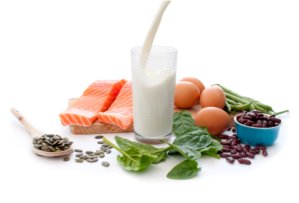Are you eating enough protein?
 Most of the protein we consume is used to build muscle, skin, hair, and nails.
Most of the protein we consume is used to build muscle, skin, hair, and nails.- Protein is also used in the energy turnover, to make hormones and antibodies, and it is also used as a transmitter in the nervous system.
- The daily need for protein varies depending on gender, muscle mass, metabolic rate, and the level and duration of physical activity.
According to the official recommendations, we should consume around 0.8 grams of protein for each kilo of body weight.
Your need for protein is increased if you have sensitive blood sugar, if you wish to lose weight, if you are pregnant or lactating, or if you are very sports-active.
Weight loss increases your need for protein
When losing weight, many people find that consuming 1.5 – 2 grams of protein for each kilo of body weight helps them reduce their risk of losing muscle mass. It is essential to choose high-quality protein (e.g. meat, fish, and eggs) for optimal combustion and to split the protein intake evenly with the main meals of the day. Many people need more protein with their breakfast and/or lunch.
- Getting too little protein may cause blood sugar problems, overweight, muscle weakness, fatigue, bad moods, and sleeping problems.
- Getting too much protein may lead to acid accumulation in the body.
Protein-rich “miracle diets” may also lead to increased urination and cause fat cells to absorb more fat.
Do not give cow’s milk to the youngest ones.
Experts have started advising parents not to give their kids cow’s milk before the age of one year. Too much bovine protein (casein) increases the risk of overweight later in life. Cow’s milk contains around three times more protein than human breast milk and is intended to help the calves grow fast. The protein in cow’s milk is especially problematic in connection with overweight, whereas CLA (conjugated linoleic acid) in milk fat slightly increases your turnover of fat.
| Protein source | Protein content in 100 grams (cooked/prepared) |
| Meat and fish | 20-25 |
| Eggs | 12 |
| Nuts | 10-14 |
| Beans (brown, white, green, soy) | 6-9 |
| Tofu (soya-bean curd) | 15 |
| Cheese/milk | 25/3.5 |
| Bread | 6-860 |
| Pasta | 5 |
| Peas, broccoli | 5-6 |
| Potatoes, rice, corn | 2-3 |
- Created on .












 "After about one week of taking the Q10 supplement I could feel a huge difference," says 23-year old Alan Piccini, who has been suffering from extreme fatigue and muscle aches ever since he was a child.
"After about one week of taking the Q10 supplement I could feel a huge difference," says 23-year old Alan Piccini, who has been suffering from extreme fatigue and muscle aches ever since he was a child. “Taking capsules with co-enzyme Q10 has freed me of the severe side effects of my cholesterol lowering medicine,” Mrs Franken explains.
“Taking capsules with co-enzyme Q10 has freed me of the severe side effects of my cholesterol lowering medicine,” Mrs Franken explains.